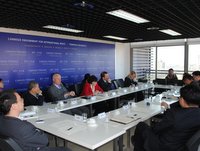Registration
Thank you!
You will receive an email confirming your registration.
IMGXYZ3636IMGZYXThe Carnegie-Tsinghua Center for Global Policy recently hosted a roundtable discussion on U.S.-China relations prior to the Strategic and Economic Dialogue meeting in May. The speakers on the American side included Carnegie’s Jessica Mathews, Douglas Paal, Kevin Tu, Yukon Huang, and Michael Pettis. Chinese participants included Yan Xuetong of Tsinghua University; Zhao Kejin of the Carnegie-Tsinghua Center for Global Policy and Tsinghua University; Zha Daojiong of Peking University’s School of International Studies; and Professor Li Bin of Tsinghua University’s Institute of International Studies. The event was moderated by the Carnegie-Tsinghua Center’s Paul Haenle.
Strategic Cooperation
- Cooperation Mechanisms: There needs to be a broader implementation of bilateral mechanisms to enable the resolution of outstanding issues straining U.S.-China relations, such as currency manipulation or climate change, Yan said. Carnegie’s Lora Saalman added that improving established mechanisms will yield better results than attempting to devise new ones.
- Public Opinion: Zhao stressed the value of civic cooperation between scholars, companies, and ordinary people in the United States and China. Yan disagreed, arguing that foreign policy is decided by policymakers and not, for example, the media or popular opinion. Furthermore, unless the media present a balanced view of critical issues, the public cannot be expected to make informed decisions on foreign policy. Mathews noted that in both the United States and China, it is increasingly difficult to engage in honest conversation with the public opinion.
- Mistrust: Both Paal and Yan agreed that as the power gap between China and the United States decreases, and as strategic interests collide, it is natural to see more areas of contention. They disagreed, however, on the extent to which mistrust plays a role in bilateral relations. Paal argued that mistrust based on cultural and institutional differences, for example between the two military establishments, is a key factor constraining the relationship. Yan contended that mistrust might have been a problem in the 1990s, but that was no longer the case. As a result, policymakers should focus on finding solutions to international political and economic issues that both sides can agree on, not overcoming mistrust.
Economic Cooperation
- China’s Future Growth: China’s relations with the United States and other developed countries will continue to improve if China maintains a free trade system, increases domestic consumption, and decreases energy consumption, Huang said. Competition between China and developed countries in the areas of high-tech products and green technology might initially cause political discord, but it will ultimately be beneficial to the world economy as a whole, he added.
- Export Controls: The level of Chinese exports to the United States is steadily increasing while U.S. exports to China vary dependent on the current relations between the two states, a phenomenon that Li ascribed to U.S. export controls. Paal explained that policymakers, especially the U.S. legislative branch, face difficulty in regulating technology due to the rapid pace of development Huang added that countries that were able to develop from low income to high income economies were not only able to purchase technologies from abroad, but also were able to develop their own indigenous industries, an important consideration for China. Saalman added that the use of export restrictions as political tools is a common practice in global foreign policy.
Energy Partnership
- Coal Imports: Tu suggested that Chinese import of American coal is beneficial to both sides, since it provides a market for American coal companies while at the same time decreasing China’s reliance on domestic coal extraction, which has lower environmental standards than extraction in the United States. Tu also stressed that diversifying the energy consumption in China to include more oil and natural gas, in the short run at least, will be good for the environment.
- Energy Cooperation: There is a need to open the American market to Chinese oil companies, argued Zha. There is already a substantial American presence in the Chinese energy sector, including in oil field security and equipment trade. A similar role for China in the American domestic market would prove beneficial in the long-run relationship of the two countries, he argued.
